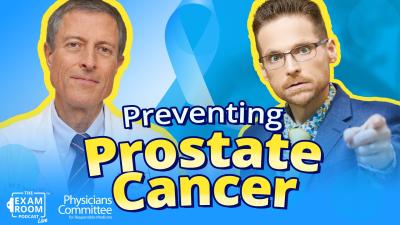Doctors Group Shares Nutrition’s Role in Prostate Cancer Prevention and Progression

WASHINGTON, D.C.— Following former President Joseph R. Biden Jr.’s prostate cancer diagnosis, the Physicians Committee for Responsible Medicine, a nonprofit with 17,000 doctor members, is sharing resources for people looking for information on nutrition’s role in reducing the risk of prostate cancer and its progression when diagnosed.
“Many men may be unaware that what they put on their plate can either increase their risk of prostate cancer or help protect against it,” says Neal Barnard, MD, president of the Physicians Committee for Responsible Medicine. “Eating a plant-based diet rich in fruits, vegetables, grains, and beans can be beneficial against prostate cancer and its progression, while eating animal products, especially dairy, is associated with an increased risk of prostate cancer.”
Prostate cancer is the most common cancer in men in the United States, according to the American Cancer Society’s 2024 annual report, as well as the second most common cause of cancer deaths. Prostate cancer disproportionately affects Black men, who are more likely to get prostate cancer and more than two times as likely to die from prostate cancer than other men.
High intakes of dairy products including whole and low-fat milk and cheese are associated with an increased risk of prostate cancer. Dairy products are also associated with an increased risk of death from prostate cancer, according to a study published in the International Journal of Cancer. Men who consumed three or more servings of dairy products a day had a 141% higher risk for death due to prostate cancer compared to those who consumed less than one serving.
The good news is that research shows that drinking soy milk every day is associated with a reduced risk of prostate cancer.
In fact, research shows that replacing all animal products with plant-based foods can be beneficial against prostate cancer and its progression.
The Adventist Health Study-2 found that men who followed a vegan diet had a 35% lower prostate cancer risk than those following a nonvegetarian, lacto-ovo-vegetarian, pesco-vegetarian, or semi-vegetarian diet.
A study of more than 2,000 men with prostate cancer found that those who ate the most plant-based foods had a 56% lower risk of prostate cancer progression and a 59% lower risk of prostate cancer recurrence compared to those who ate the least. In a study led by Dean Ornish, MD, men newly diagnosed with prostate cancer who made lifestyle changes including eating a plant-based diet, reducing stress, and exercising lowered their PSA levels, while the PSA levels of those in the control group, who made no changes, increased. Elevated PSA levels can indicate prostate cancer.
Dr. Ornish will present Can Lifestyle Changes Slow, Stop, or Reverse the Progression of Low-Grade Prostate Cancer? this August at the Physicians Committee for Responsible Medicine’s International Conference on Nutrition and Medicine. Peter Carroll, MD, MPH, will present Prostate Cancer Screening, Treatment Planning, and Prevention, and Edward Giovannucci, MD, ScD, will present What Role Does Nutrition Play in Prostate Cancer.
Learn more about diet’s role in prostate cancer at PCRM.org/ProstateCancer.
Founded in 1985, the Physicians Committee for Responsible Medicine is a nonprofit organization that promotes preventive medicine, conducts clinical research, and encourages higher standards for ethics and effectiveness in education and research.








